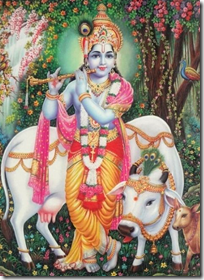![[Shri Krishna]](https://krishnasmercy.files.wordpress.com/2020/06/image-27.png?w=119&h=162) “He quickly becomes righteous and attains lasting peace. O son of Kunti, declare it boldly that My devotee never perishes.” (Lord Krishna, Bhagavad-gita, 9.31)
“He quickly becomes righteous and attains lasting peace. O son of Kunti, declare it boldly that My devotee never perishes.” (Lord Krishna, Bhagavad-gita, 9.31)
Download this episode (right click and save)
क्षिप्रं भवति धर्मात्मा
शश्वच्-छान्तिं निगच्छति
कौन्तेय प्रतिजानीहि
न मे भक्तः प्रणश्यति
kṣipraṁ bhavati dharmātmā
śaśvac-chāntiṁ nigacchati
kaunteya pratijānīhi
na me bhaktaḥ praṇaśyati
“I noticed something interesting since taking up bhakti-yoga. My attempt is rather meager, but I can tell it is making a difference. I know for certain that the process is equivalent with sanatana-dharma. In other words, it just feels like the right way to live; the application is universal.
“Devotion to God the person is not sectarian. It does not fall within the range of the common argument of, ‘My religion against your religion,’ or ‘My God versus your God.’ Universal brotherhood is one of the results. I know that I am related to every other living thing in a way, since we are all part of the Brahman energy.
“What I have noted, however, is massive regret. I cringe at so many memories from the past, relating to my behavior. Things I have said. What I have done. My lack of compassion in certain cases. Willful dishonesty. Deceit. Envy.
“I think that I am so good now, that I am following dharma’s way, but I have trouble lecturing anyone else since I remember these incidents. After all, isn’t every person flawed to a large degree? Are their mistakes just a product of illusion? How do I shake the regret? How do I move forward and forget my past life, even though it is part of this one?”
This knowledge and remembrance is a component of the enlightenment itself. Both sides have the same source. The Supreme Personality of Godhead, Shri Krishna, is responsible for remembering and forgetting.
सर्वस्य चाहं हृदि सन्निविष्टो
मत्तः स्मृतिर् ज्ञानम् अपोहनं च
वेदैश् च सर्वैर् अहम् एव वेद्यो
वेदान्त-कृद् वेद-विद् एव चाहम्sarvasya cāhaṁ hṛdi sanniviṣṭo
mattaḥ smṛtir jñānam apohanaṁ ca
vedaiś ca sarvair aham eva vedyo
vedānta-kṛd veda-vid eva cāham“I am seated in everyone's heart, and from Me come remembrance, knowledge and forgetfulness. By all the Vedas am I to be known; indeed I am the compiler of Vedanta, and I am the knower of the Vedas.” (Lord Krishna, Bhagavad-gita, 15.15)
To dwell too much on the past mistakes is not a good use of time. We can compare it to the crying of a child. Should we feel bad for having behaved that way in our youth? Does anyone hold a grudge against a toddler who screams about wanting to splash water everywhere?
In some ways, these incidents create fond memories. Part of the growing up process. The parents do not mind, and in the same way the Supreme Lord overlooks the past mistakes. He does not hold it as an offense; otherwise no person would be eligible for liberation.
If I am genuine in my devotional practices, then the mistakes get corrected eventually. There is no need to dwell, though the wise person always maintains compassion, kindness, and care towards those who are struggling.
 Bhagavan remembers every good deed done in His honor, even if there is only one. If I just once offered some fruit or water towards His beautiful deity in the temple, or I one time called out His name in the maha-mantra, He takes note and the benefit cannot be erased: Hare Krishna Hare Krishna, Krishna Krishna, Hare Hare, Hare Rama Hare Rama, Rama Rama, Hare Hare.
Bhagavan remembers every good deed done in His honor, even if there is only one. If I just once offered some fruit or water towards His beautiful deity in the temple, or I one time called out His name in the maha-mantra, He takes note and the benefit cannot be erased: Hare Krishna Hare Krishna, Krishna Krishna, Hare Hare, Hare Rama Hare Rama, Rama Rama, Hare Hare.
In Closing:
Despite through illusion chased,
That benefit cannot be erased.
Where to the sparkling temple went,
And time in meditation spent.
And that apple offering at His feet,
In that chance moment to meet.
My past mistakes forgetting,
Since arrived in Divine setting.

No comments:
Post a Comment